- Home
- Deborah Harkness
Time's Convert Page 4
Time's Convert Read online
Page 4
“Marcus is still so young.” Matthew sighed.
“Are you serious?” Marcus had been reborn a vampire in 1781. Two-hundred-plus years seemed plenty grown up to me.
“I know what you’re thinking, Diana, but when a human is made a vampire, they have to mature all over again. It can take a very long time before we are ready to strike out on our own,” Matthew said. “Our judgment can be faulty when we’re in the first flush of vampire blood.”
“But Marcus has already sown his wild oats.” The family was quick to tell tales of Marcus’s early years in America, the scandals and scrapes in which he became entangled, the difficulties from which he’d had to be extracted by senior members of the de Clermont family.
“Which is precisely why he can’t be allowed to supervise Phoebe’s transformation. Marcus is about to take a newly reborn vampire as a mate. It would be a major step under any circumstances, but given his youth . . .” Matthew paused. “I hope I’m doing the right thing, letting him take this step.”
“The family is doing what Marcus and Phoebe wanted,” I said, making sure that my emphasis registered. “They’re old enough—be they cold-blooded vampire or warmblooded human—to know their own minds.”
“Are they?” Matthew adjusted his position so that his eyes could meet mine. “That’s a very modern notion you have, that a man just turned four-and-twenty and a young woman of about the same age would be sufficiently experienced to determine the course of their future lives.” He was teasing, but his lowered eyebrows indicated that part of him believed what he said.
“It’s the twenty-first century, not the eighteenth,” I observed. “Besides, Marcus is not a man of ‘four-and-twenty,’ as you so charmingly put it, but two hundred and fifty plus.”
“Marcus will always be a child of that earlier time,” Matthew said. “If it were 1781, and it was Marcus who was experiencing his first day as a vampire and not Phoebe, he would have been considered in need of wise counsel—and a strong hand.”
“Your son has asked every member of this family—and Phoebe’s, too—for advice,” I reminded him. “It’s time to let Marcus determine his own future, Matthew.”
Matthew was silent, his hand moving along the faint scars that had been left on my back by the witch Satu Järvinen. Over and over he traced them, lines of regret that reminded him of every time he had failed to protect those he loved.
“It will all be fine,” I assured him, snuggling closer.
Matthew sighed. “I hope you’re right.”
* * *
—
LATER THAT DAY, a marvelous air of quiet descended on Les Revenants. I looked forward to these rare moments of peace—often a mere twenty minutes, occasionally a blissful expanse of an hour or more—from the moment I awoke.
The children were in the nursery, tucked in for naps. Matthew was in his library working on a paper he was co-writing with our Yale colleague, Chris Roberts. They were scheduled to reveal more of their research findings at conferences this autumn and were already gearing up to submit an article to a leading scientific journal. Marthe was in the kitchen canning fresh beans in peppery brine while watching Plus belle la vie on the television Matthew had installed there. Marthe had insisted she had no interest in such technological fripperies, but she was soon hooked on the escapades of the residents of Le Mistral. As for me, I was avoiding my grading in favor of my new research into the connections between early modern cooking and laboratory practices. But I could spend only so much time bent over images of seventeenth-century alchemical manuscripts.
After an hour of work, the glorious May weather called to me. I made myself a cold drink and went upstairs to the wooden deck that Matthew had constructed between the battlements atop one of Les Revenants’ crenellated towers. Ostensibly it was built to provide views of the surrounding countryside, but everybody knew its primary purpose was defensive. It provided a good lookout, and would give plenty of advance warning if a stranger approached. Between our new rooftop aerie and the cleaned and refilled moat, Les Revenants was now as secure as Matthew could make it.
There I found Marcus, wearing dark glasses and lounging in the midday heat, the summer sun streaking his blond hair.
“Hello, Diana,” Marcus said, putting aside his book. It was a slender volume, the brown leather cover stained and pitted with age.
“You look like you need this more than I do.” I handed him my glass of iced tea. “Lots of mint, no lemon, no sugar.”
“Thanks,” Marcus said. He took an appreciative sip. “Delicious.”
“May I join you, or are you up here to escape?” Vampires were pack animals, but they definitely liked their alone time.
“This is your house, Diana.” Marcus drew his feet from the seat of the nearby wooden chair that he was using as an impromptu ottoman.
“This is the family’s house, and you are welcome in it,” I replied, quick to correct him. The separation from Phoebe was going to be hard enough without Marcus feeling like an intruder. “Any more news from Paris?”
“No. Grand-mère told me to not expect another call from Freyja for three days at the earliest,” Marcus replied, sliding his fingers again and again through the moisture collecting on the outside of the chilled glass.
“Why three days?” Perhaps this was some kind of vampiric Apgar test.
“Because that’s how long you wait before you give a vampire infant any blood that doesn’t come from their sire’s veins,” Marcus replied. “Weaning a vampire off their maker’s blood can be tricky. If a vampire ingests too much foreign blood too soon, it can trigger deadly genetic mutations. Sometimes, vampire infants die.
“It will also be Phoebe’s first psychological test, to make sure that she can survive by taking another creature’s blood,” Marcus continued. “They’ll start with something small, of course—a bird or a cat.”
“Um-hmm,” I said, trying to sound approving while my stomach flipped.
“I made sure Phoebe could kill something—before.” Marcus stared into the distance. “Sometimes it’s harder to take a life when you have no choice.”
“I would have thought the opposite,” I said.
Marcus shook his head. “Oddly enough, when it’s no longer a question of sport, you can lose your nerve. Instinctive or not, it’s a selfish act to survive at some other creature’s expense.” He tapped his book against his leg, an anxious thrum.
“What are you reading?” I asked, trying to change the subject.
“An old favorite.” Marcus tossed the volume to me.
Usually, the family’s cavalier attitude toward books earned them a lecture from me, but this one had obviously seen worse treatment. Something had nibbled one corner. The leather was even more stained than it had appeared at first glance, and the cover was covered with ring-shaped marks left by glasses, tankards, and cups. There were traces of gilt in the stamped decorations, and their style indicated the book had been bound sometime in the early nineteenth century. Marcus had read the book so often that the binding had split and there were multiple repairs—one made with yellowing cellophane tape.
A cherished item like this held a specific magic, one that had nothing to do with its value or condition and everything to do with its significance. Carefully, I cracked open the tattered cover. To my surprise, the book inside was decades older than the binding suggested.
“Common Sense.” It was a foundational text of the American Revolution. I’d expected Marcus to be reading Byron, or a novel—not political philosophy.
“Were you serving in New England in 1776?” I asked, noting its date and Boston publication. Marcus had been a soldier and then a surgeon in the Continental army. That much I knew.
“No. I was still at home.” Marcus took the book from me. “I think I’ll take a walk. Thanks for the tea.”
It seemed Marcus was not in the mood for further confidenc
es.
He disappeared down the stairs, leaving a trail of discordant threads shimmering in his wake: red and indigo tangled up with black and white. As a weaver, I could perceive the woven strands of past, present, and future that bound the universe together. Normally the clear tones of blue and amber that made up the sturdy warp were visible, and the colored threads of individual experience provided bright, intermittent notes in the weft.
Not today. Marcus’s memories were so powerful, and so distressing to him, that they were distorting the fabric of time, creating holes in its structure to make way for some forgotten monster to emerge from the past.
The gathering clouds on the horizon and the pricking in my thumbs warned me that stormy times lay ahead. For all of us.
4
One
13 MAY
Phoebe sat before the locked windows in her bedroom with the plum-colored drapes fully open to the view of Paris, satiated with her maker’s blood, devouring the city with her eyes, hungering only for the next revelation afforded by her new sense of sight.
The night, she discovered, was not simply black but a thousand shades and textures of darkness, some gossamer, others velvet, ranging from the deepest purples and blues to the palest of grays.
Life would not always be so easy. Now there was a knock on the door before the gnawing had a chance to start eating away at her belly. Phoebe would have to feel her hunger eventually so that she could understand what it was to covet the lifeblood of a creature and manage her urge to take it.
Her only urge now, however, was to paint. Phoebe hadn’t done so for years, not since a casual remark from a teacher—cutting, dismissive—had sent her into the historical study of art rather than its practice. Her fingers itched to pick up a brush and dip it into thick oil paint or delicate watercolor pigments and apply them to canvas or paper.
Could she capture the precise color of the tiled roof across the garden—blue-gray touched with silver? Was it possible to convey the inky blackness of the sky high above, and its sharp metallic gleam at the horizon?
Phoebe understood now why Matthew’s great-grandson, Jack, covered any surface he could with chiaroscuro renderings of his memories and experiences. The play of light and shadow was endless, a game that you could watch for hours without ever feeling bored.
She’d learned this from the single candle that Freyja had left burning in a silver holder on the dressing table. The undulating light and the darkness at the heart of the flame were mesmerizing. Phoebe had begged for more candles, wanting to surround herself with the pinpricks of brightness that dazzled and dipped.
“One is enough,” Freyja said. “We don’t want you light-struck on your first day.”
So long as Phoebe was fed regularly, sensory assault was the greatest danger to her as a newly made vampire. To prevent any mishaps, Freyja and Miriam carefully controlled Phoebe’s environment, minimizing her chances of getting lost in feeling.
Immediately after her transformation, for example, Phoebe had wanted a shower. Freyja judged the needlelike fall of water too severe, so Françoise drew her a warm bath instead—strictly timed so that Phoebe didn’t become consumed by the soft slip of water against her skin. And all the windows in the house, not just those in Phoebe’s bedroom, were locked against the alluring scents of warmbloods, the neighbors’ pets, and pollution.
“I’m sorry, Phoebe, but an infant male went mad in the Paris Metro last year,” Freyja explained when she asked if one window might be opened just a crack to let in the breezes. “The fumes from the old braking system were irresistible to him, and we lost him along Line Eight. It caused no end of delays for morning commuters and made the mayor very cross. Baldwin, too.”
Phoebe knew she could break the glass with ease, along with the window frames, and even punch a hole in the wall if escape became necessary. But resisting these temptations was a test of her control, her obedience, and her suitability as Marcus’s mate. Phoebe was determined to pass the test, so she sat in the airless room and watched the colors flicker and drift as a cloud crossed the moon, or a faraway star died in the heavens, or the turning of the earth brought the sun fractionally closer.
“I would like some paint.” Phoebe said it in a whisper, but the sound echoed in her ears. “And brushes.”
“I’ll ask Miriam.” Freyja’s reply came from far away. She was, based on the endless scratching that tickled Phoebe’s nerves ever so slightly, writing in her journal with a fountain pen. Occasionally, Freyja’s heart gave a slow thump.
Even farther away, in the kitchens, Charles was smoking a cigar and reading the newspaper. Rustle. Puff. Silence. Thump. Rustle. Puff. Silence. Just as a Paris night had its own colorscape, so every creature had his or her own rhythmic accompaniment—like the song Phoebe’s heart had made when she first drank from Miriam.
“Do you need something else, Phoebe?” Freyja’s pen paused. In the kitchen, Charles stubbed out his cigar in a metal ashtray. Both waited attentively for Phoebe’s response. It would take her some time to get used to holding conversations with people in different rooms, never mind entirely separate floors of a large house.
“Only Marcus,” replied Phoebe, wistful. She had grown accustomed to thinking of herself as part of a we, not as a solitary me. There was so much she wanted to tell him, so much she wanted to share about her first day of being reborn. Instead, they were separated by hundreds of miles.
“Why not practice walking?” Freyja asked, capping her pen. Moments later, Marcus’s aunt was at the door, the key turning smoothly in the lock. “Let me help you.”
Phoebe blinked at the change in the room’s atmosphere as the soft glow of the candlelit house seeped across the threshold.
“The light is a living thing,” Phoebe said, awed by the realization.
“Both wave and particle. It is astonishing it took warmbloods so long to figure that out.” Freyja stood before Phoebe, hands outstretched in a gesture of assistance. “Now, remember not to push on the chair with your hands, or against the floor with your feet. Getting up is simply a matter of unfolding for a draugr. It is not necessary to exert oneself.”
Phoebe had been a vampire less than twenty-four hours and had already broken several chairs and put a sizable dent in the tub.
“Float up. Just think up and rise. Steady. Good.” Freyja gave constant feedback, like Phoebe’s childhood ballet mistress, a similarly draconian figure though only a fraction of Freyja’s Valkyric height. It was Madame Olga who had helped Phoebe understand that size has nothing to do with stature.
The memory of Madame Olga snapped Phoebe’s spine straight, and she instinctively took hold of Freyja’s hands as if they were a wooden barre. She heard a crack and felt something give way.
“Oh, dear, there goes a finger.” Freyja released Phoebe’s hand. Her left index finger was hanging at a strange angle. Freyja aligned it with a quick tug.
“There you are. Everything’s in working order again. You’ll probably break other bones before summer’s end.” Freyja linked her arm through Phoebe’s elbow. “Let’s stroll around the room. Slowly.”
It was evident why warmbloods thought vampires could fly. All a vampire had to do was think of the destination and she was there in a blink, with no memory of putting any effort into locomotion.
Phoebe felt like the newborn she was, taking one trembling step at a time and then pausing to regain her equilibrium. In addition to everything else, her center of gravity seemed to have shifted. It was no longer in her pelvis but in her heart, which made Phoebe feel tipsy and strange, as if she’d had too much champagne.
“Marcus told me he was a fast learner when it came to being a vampire.” Phoebe began to relax into Freyja’s stately pace, which felt more like waltzing than walking.
“He had to be,” Freyja said with a touch of regret.
“Why?” Phoebe frowned. The sudden turn of her head to st
udy Freyja’s expression sent her tumbling toward her companion.
“You know better than to ask, Phoebe darling.” Freyja gently set her back on her feet. “You must save your questions for Marcus. A draugr does not carry tales.”
“Do vampires have a thousand names for themselves, like the Sami have a thousand names for reindeer?” Phoebe wondered, taking mental note of the latest entry in her expanding lexicon.
“More, I think,” replied Freyja, her brow creased. “Why, we even have a name for the tattletale vampire who tells someone’s mate about their past without permission.”
“You do?” Phoebe was eager to know it.
“Absolutely,” Freyja said solemnly. “Dead vampire.”
Phoebe was worn out with the effort it took to move slowly like a warmblood, without cracking a floorboard or breaking a bone, after making it safely around the perimeter of the room just twice. Freyja left her to recover in peace and returned to her morning room, where she would continue writing in her journal until sunrise.
Phoebe snuffed out the candle to better see night give way to the day, her cold fingers barely registering the heat of the burning wick, and climbed into bed out of habit rather than any hope of sleeping. She drew the coverlet up to her chin, reveling in the smooth fabric and crisp finish.
She lay in the soft bed, looking out at the night, listening to the music of Freyja’s pen, and the muffled sounds from the garden outside, and the street beyond the walls.
I am.
Evermore.
Phoebe’s heart song had changed. It was slower and steadier, all the extraneous effort of her human heartbeat removed and perfected into something simpler and more compelling.
I am.
Evermore.
Phoebe wondered what Marcus’s heart song would sound like. It would be melodic and pleasing, she felt sure. She longed to hear it and commit it to memory.
“Soon,” Phoebe told herself in a whisper, a reminder that she and Marcus had all the time in the world. “Soon.”

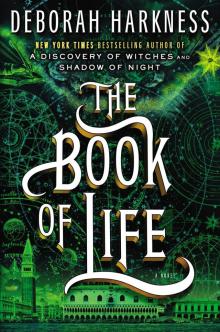 The Book of Life
The Book of Life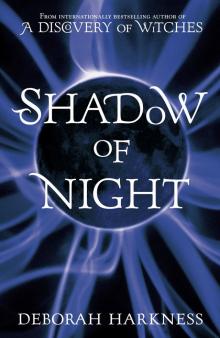 Shadow of Night
Shadow of Night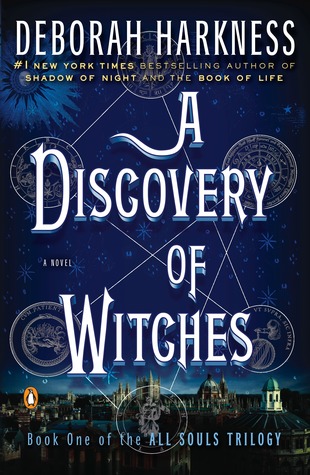 A Discovery of Witches
A Discovery of Witches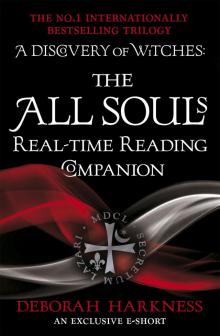 The All Souls Real-Time Reading Companion
The All Souls Real-Time Reading Companion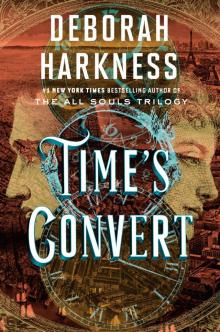 Time's Convert
Time's Convert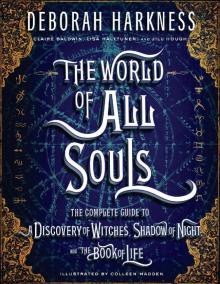 The World of All Souls
The World of All Souls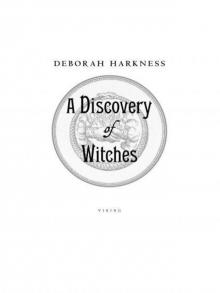 A Discovery of Witches: A Novel (All Souls Trilogy)
A Discovery of Witches: A Novel (All Souls Trilogy)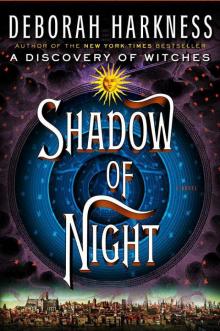 Shadow of Night: A Novel
Shadow of Night: A Novel